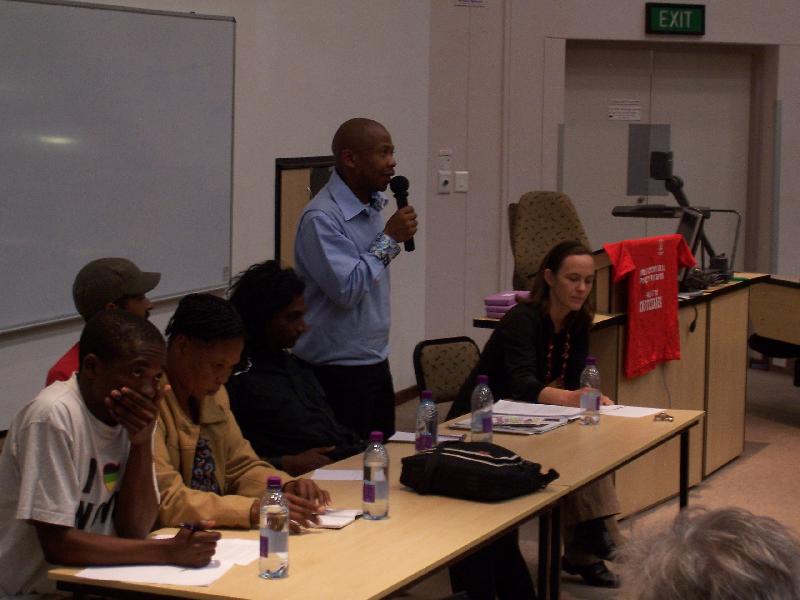
In our country of such vast divides, it is perhaps not surprising that one can attend two events dealing with the same topic, and come away with two very different views. After Peter Alegi's cautiously optimistic take on the unifying effect of the Soccer World Cup, it was sobering to attend the following day's panel discussion by members of the Western Cape Anti-Eviction Campaign, the Unemployed People's Movement and Abahlali baseMjondolo.
Teach-In attendees came away with a much greater insight into just how alienating the Soccer World Cup was for those members of our society who exist in a state of permanent, extreme and unalleviated poverty.
Ashraf Cassiem of the Western Cape Anti-Eviction Campaign was the first speaker, and one with an easy rapport with his topic and his audience. So easy, in fact, that it was obvious that he could have spoken for a considerably longer time! Giving us a brief history of the Anti-Eviction Campaign, Cassiem explained that the organisation arose as a spontaneous reaction by communities who were facing evictions, school fees arrears and difficulty accessing grants.
In 2006/2007, when the agreement to host the Soccer World Cup was reached, the number of people facing displacement rose sharply as the so-called “nuisance law” came into effect. This was passed to 'clean up' areas such as Athlone and Green Point, where the new stadium was eventually built. People who made their livings on the streets – car washers, hawkers, car guards and beggars – were being displaced two to three years before the Cup began.
During Campaign meetings, the idea for the Poor People's World Cup was born, an alternative tournament made up of teams from disadvantaged communities who each took the name of a participating country. The PPWC began in June; due to lack of sponsorship the final was only played in August.
The alternative Cup garnered a great deal of international press interest, but, says Cassiem, virtually no local media supported the initiative. Despite this, the platform for poor communities to raise their voices rattled the government, with statements countering their claims being released.
Mrs Constance Magagula, of Abahlali baseMjondolo in Durban, spoke in Xhosa, and was translated by a member of the Department of Politics and International Studies. With great dignity Mrs Magagula explained that the poor were not consulted on the plans surrounding the Cup. Street hawkers were removed from their spots, prostitution increased, schools were disrupted and food prices went up steeply. The rights of the poor, she stated, were infringed in favour of rich people from foreign countries.
Last to take the microphone was Ayanda Kota, of the Grahamstown Unemployed People’s Movement. Always a charismatic speaker, Kota began by outlining the tortured death of Steven Bantu Biko, 33 years ago almost to the day. A moment of silence was followed by rousing cries of “Amandla! Uwethu!” before Kota returned to the topic by stating “We love football.” Political prisoners played it on Robben Island; for the ordinary person soccer provided an escape from the harsh injustice of the apartheid regime. It became, says Kota, an instrument to mobilise the people. It gave meaning and dignity to people's lives.
However, as much as we love soccer, “we hate profit”, Kota continued, and the 2010 Soccer World Cup was a giant capitalist venture. The same government which spent up to R80 billion on preparing for and hosting the tournament can not provide clean water, can not provide houses and schooling for its people, can not repair roads. The working classes, says Kota bitterly, once again had to be content with “crumbs from the master's table.” South Africa, he says, remains the most unequal nation in the world, and the Soccer World Cup a project of the ruling class.
